
Introduction
The liver doesn’t get much attention, but it plays a huge role in keeping us alive and well. Weighing about three pounds, this hardworking organ quietly handles more than 500 different jobs every day. It acts like a filter for our blood, helps turn food into energy and nutrients, and even makes proteins that our bodies need to function properly. Whether it’s breaking down what we eat, storing important vitamins, or clearing out harmful stuff from our system, the liver is always on the job.
But even though it does so much for us, we often don’t think about it especially with the busy, high-stress lives many of us lead today. The choices we make, from what we eat to how much we sleep, can wear it down over time. And when the liver isn’t working as it should, it affects everything else too. It’s a quiet hero, and it deserves more care than it usually gets.
Liver detoxes have become a big trend in recent years. Everywhere you look, there are products and programs that promise to clean out your liver, make it feel new again, and help it work better. From juice plans and herbal pills to strict eating rules, the market is full of quick fixes that play on our hope of living a healthier life. But it’s important to look at these promises with care and ask what’s really true.
The truth is, your liver is already built to clean itself. It has a smart and powerful system that works every day to remove things your body doesn’t need. It doesn’t need a special cleanse to do what it’s meant to do. What it does need is regular support like good food, enough sleep, movement, and care. A healthy liver doesn’t come from a short-term fix. It comes from steady habits that give your body what it needs to stay strong over time.
This guide is here to help you get past the hype and find real answers. You’ll learn what science says about how the liver works and what helps it. We’ll talk about food and natural ingredients that may support liver health, and give you simple tips you can use in your daily life. The goal is to give you clear, honest information so you can make smart choices and take better care of your body.
At the same time, it’s important to remember that while natural options can help, they don’t replace medical advice. If you already have a health problem, or you’re thinking about making big changes to your diet or routine, it’s always best to talk with a doctor first. Working with your body and your doctor you can build a plan that supports your liver and helps you feel your best, not just for now, but for life.
Understanding Liver Health and Dysfunction
Before we can really value the natural remedies and habits that support liver health, it helps to understand how the liver actually works and what can get in the way of that process. The liver is one of the most important organs in the body. It handles a huge number of jobs that are essential for staying alive and feeling well. From processing nutrients to breaking down harmful substances, it’s involved in almost everything our body does to keep us healthy.
A. How the Liver Works: A Closer Look at Detoxification
The liver’s job of cleaning out toxins is often described in simple terms, but in reality, it’s a detailed and finely tuned process. This process happens in two main steps, known as Phase I and Phase II detoxification. These two phases work together to take harmful substances many of which are stored in fat and turn them into water-based forms that the body can safely get rid of through urine or bile.
Phase I: Getting Toxins Ready
This first step is sometimes called the “preparation phase.” During this stage, a group of enzymes mainly the cytochrome P450 (CYP450) enzymes go to work. These enzymes act like tiny scissors, breaking toxins down into smaller parts. But here’s the catch: these smaller parts can sometimes be even more harmful than what you started with. That’s why it’s so important that Phase II kicks in right away to finish the job.
To keep Phase I running smoothly, your body needs certain nutrients like B vitamins (B2, B3, B6, B12), folic acid, glutathione, and antioxidants such as Vitamin C and Vitamin E.
Phase II: Making Toxins Safe
In this second step, often called the “conjugation phase,” the liver takes those reactive pieces from Phase I and makes them harmless. It does this by attaching small water-based molecules to the toxins so the body can flush them out. There are several different ways the liver does this, and each one uses its own set of enzymes and nutrients.
Glutathione Conjugation: This is one of the most important detox pathways. It uses glutathione—a powerful antioxidant that your body makes naturally to neutralize harmful substances. This pathway is especially important for clearing out heavy metals, pesticides, and certain medications.
Sulfation: In this pathway, the liver uses sulfur-rich compounds to break down and remove substances like hormones, brain chemicals (neurotransmitters), and some medications. It’s also a key player in balancing hormone levels.
Glucuronidation: This pathway attaches toxins to glucuronic acid, a type of sugar made in the body. It’s essential for removing things like bilirubin (a waste product from red blood cells), steroid hormones, and chemicals from the environment.
Glycination and Taurination: These two pathways use the amino acids glycine and taurine. They help detoxify bile acids and a range of organic acids that build up through digestion and metabolism.
Acetylation and Methylation: These pathways help the liver clear out amines and other compounds that come from foods, medications, and the body’s own processes. They also play a role in energy production, mood balance, and even gene expression.
The way your liver handles detoxification through both Phase I and Phase II depends heavily on having the right nutrients, enzymes, and helper molecules in place. If even one of these is missing or low, the whole process can slow down. When that happens, toxins can start to build up instead of being cleared out. This puts extra pressure on the liver and can affect your overall health, not just in the liver but throughout the body.
B. Factors Affecting Liver Health
The liver is tough and hardworking, but it’s not immune to the ongoing stress of modern life. Over time, certain habits and exposures can wear it down, affecting its ability to do its job. Here are some of the biggest factors that can put your liver at risk:
- Diet Choices: Eating a lot of processed foods, sugary snacks, unhealthy fats (like trans fats and too much saturated fat), and artificial additives puts real pressure on the liver. These foods are hard to break down and can lead to inflammation and fat buildup. Over time, this can cause conditions like nonalcoholic fatty liver disease (NAFLD).
- Alcohol Use: Drinking too much alcohol, especially over a long period, is one of the leading causes of liver damage. The liver has to work hard to break alcohol down, and in the process, it creates toxic byproducts that can hurt liver cells. This can lead to fatty liver, inflammation (hepatitis), and even scarring (cirrhosis).
- Toxins in the Environment: Every day, we’re exposed to chemicals from pesticides, cleaning products, air pollution, and even plastics. The liver has to process all of this. If the exposure is constant or high, it can overwhelm the liver’s detox system and cause long-term harm.
- Medications and Supplements: While medicine plays an important role in treating illness, many drugs including common pain relievers can affect liver health if taken too often or in high doses. Even some herbal supplements can be harmful if not used correctly. Always follow the instructions and talk to a healthcare provider if you’re unsure.
- Obesity and Fatty Liver: Carrying extra weight, especially around the belly, is strongly linked to NAFLD a condition where fat builds up in the liver even if you don’t drink alcohol. This can progress to more serious problems like liver inflammation, scarring, and even failure. NAFLD is now the most common liver condition in many parts of the world.
- Viral Infections: Viruses like hepatitis A, B, and C can cause liver inflammation. While hepatitis A usually goes away on its own, hepatitis B and C can become long-term issues that may lead to cirrhosis or liver cancer. Vaccination and safe health practices are key to preventing these infections.
- Other Liver Conditions: Some people may face liver problems due to autoimmune issues, inherited conditions, or metabolic disorders. These can interfere with how the liver works and may require long-term care and support.
C. Signs and Symptoms of Liver Stress
Even though the liver is often called the “silent organ” because it can take a lot of damage without showing clear signs, it’s not completely quiet. When it’s under long-term stress or not working well, your body may start to send out warning signals. These can show up as things like low energy, trouble with digestion (like nausea or feeling bloated), or changes in your skin, such as yellowing (jaundice) or itching. You might also notice dark urine, pale-colored stools, changes in your weight you can’t explain, or just a general feeling of being unwell. Catching these signs early gives you a chance to take action and give your liver the support it needs before more serious problems develop.
Natural Foods for Liver Support
The liver is naturally built to detoxify it’s what it does best. But how well it works depends a lot on what we feed it. A diet full of whole, unprocessed foods that are rich in nutrients, antioxidants, and fiber gives the liver what it needs to do its job well. These foods don’t “detox” the liver the way trendy products claim to. Instead, they give your body the raw materials it needs like vitamins, minerals, and other key nutrients to keep its natural detox systems running smoothly and efficiently.
A. The Power of Whole Foods: A Foundation for Liver Health
Focusing on nutrient-rich, unprocessed foods is one of the most effective ways to support your liver. These foods are naturally low in harmful ingredients like refined sugars, unhealthy fats, and additives that can slow the liver down. Instead, they’re packed with compounds that help the liver do what it’s meant to do process nutrients, remove toxins, and keep your body balanced. Here’s how whole foods make a difference:
- Antioxidants: These powerful compounds help protect liver cells from damage caused by oxidative stress. You’ll find antioxidants like vitamin C, vitamin E, beta-carotene, and polyphenols in colorful fruits, vegetables, herbs, and spices.
- Fiber: Fiber plays a key role in getting rid of waste. It helps move toxins out of the body through the digestive system, which keeps them from being reabsorbed—and gives the liver a break. Fiber also supports a healthy gut, which is closely connected to liver health.
- Vitamins and Minerals: Your liver needs a steady flow of nutrients to power its detox systems. B vitamins (like B6, B12, and folate) and minerals such as magnesium, selenium, and zinc are especially important for keeping those pathways running smoothly.
- Phytonutrients: These natural compounds found in plants offer extra layers of protection. They help calm inflammation and may even boost the liver’s own detox enzymes, offering direct support for its daily work.
B. Specific Foods That Support a Healthy Liver
Let’s look at different groups of foods and how each helps keep your liver in top shape:
Leafy Greens (Spinach, Kale, Collard Greens, Arugula, Romaine Lettuce)
Leafy greens are nutritional powerhouses loaded with chlorophyll, the green pigment that may help soak up toxins from the blood, easing the liver’s workload. They’re also full of antioxidants like vitamins K, A, and C, plus minerals such as magnesium and potassium. Their high fiber content supports digestion and helps flush out waste.
These greens encourage bile flow, which is essential for removing toxins through the digestive system. Adding a variety of leafy greens to your meals whether in salads, smoothies, or cooked dishes is a simple way to boost your liver’s natural cleansing power.
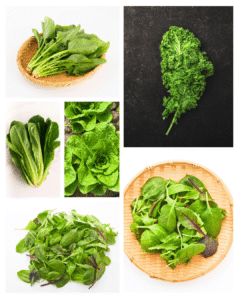
Cruciferous Vegetables (Broccoli, Cabbage, Cauliflower, Brussels Sprouts, Kale, Bok Choy)
Cruciferous veggies stand out for their ability to support liver detox. They contain glucosinolates, sulfur compounds that turn into active substances like sulforaphane and indole-3-carbinol (I3C) when eaten. These help activate the liver’s Phase II detox enzymes, enhancing its ability to neutralize harmful chemicals. They’re also rich in glutathione, the body’s master antioxidant that binds toxins and makes them easier to flush out. Eating these vegetables regularly is a smart choice for strong liver health.
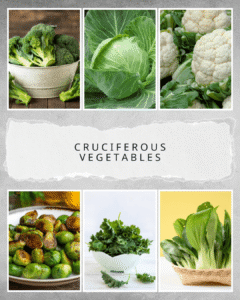
Garlic and Onions
These flavorful alliums are more than just tasty they’re great for liver health. Garlic contains allicin and selenium, which help activate detox enzymes and protect the liver from damage. Onions also provide sulfur compounds and flavonoids that support detoxification and reduce inflammation. Including garlic and onions in your cooking can boost your liver’s function.
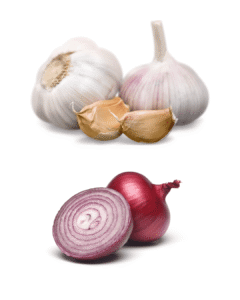
Citrus Fruits (Lemons, Limes, Grapefruits, Oranges)
Citrus fruits are rich in vitamin C, a powerful antioxidant that protects liver cells. Grapefruit, for example, contains flavonoids like naringenin and hesperidin that help activate detox enzymes and reduce fat buildup in the liver. Lemons and limes, especially when added to water, can stimulate bile production, helping flush toxins from the liver. Starting your day with warm lemon water is a popular, hydrating habit that may gently support your liver’s natural cleansing.
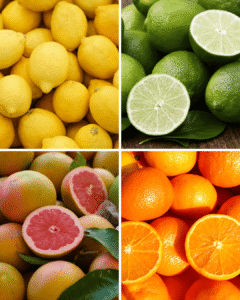
Berries (Blueberries, Raspberries, Strawberries, Cranberries)
Berries are full of antioxidants called anthocyanins, which protect liver cells from damage and inflammation. Studies suggest berries can lower markers of liver injury and boost antioxidant defenses. Their fiber also helps digestion and toxin elimination. Eating a variety of berries regularly supports long-term liver health.
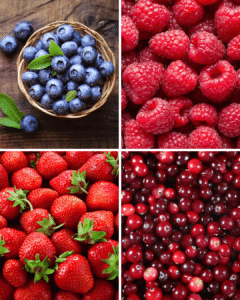
Beets
Beets have betalains, antioxidants with strong anti-inflammatory and detox benefits. They support Phase II detox pathways and promote bile flow, helping the liver remove waste efficiently. Beets also contain pectin, a fiber that aids toxin elimination. Enjoy them roasted, juiced, or in salads to help your liver’s cleansing work.
Avocado
Avocados are rich in healthy fats and glutathione, the master antioxidant crucial for liver detox. Their fats help reduce inflammation and support liver cell repair. Avocados provide key nutrients that protect the liver from damage, making them a valuable addition to your diet.
Olive Oil
Extra virgin olive oil is packed with anti-inflammatory monounsaturated fats and antioxidant polyphenols. Research shows it may reduce fat buildup in the liver, improve insulin sensitivity, and lower liver stress markers, especially in people with fatty liver disease. Using olive oil as your main cooking fat and in dressings supports both liver and overall health.
Nuts (Walnuts, Almonds, Brazil Nuts)
Nuts offer healthy fats like omega-3s that fight inflammation. Walnuts are rich in glutathione and L-arginine, an amino acid that aids detox. Almonds provide vitamin E, which protects liver cells, and Brazil nuts are high in selenium, vital for antioxidant defense. A daily handful of mixed nuts can support your liver’s function.
Fatty Fish (Salmon, Mackerel, Sardines, Tuna)
Fatty fish are top sources of omega-3 fatty acids EPA and DHA, which reduce liver inflammation and prevent fat buildup. Eating fatty fish two to three times a week can help keep your liver healthy and reduce the risk of fatty liver disease.
Whole Grains (Oatmeal, Brown Rice, Quinoa, Millet, Barley)
Whole grains are high in fiber, which aids digestion and toxin elimination, easing the liver’s workload. They also help stabilize blood sugar, preventing insulin resistance and liver fat accumulation. Choosing whole grains over refined grains supports metabolic and liver health.
Coffee and Green Tea
- Coffee: Studies show that drinking coffee regularly can lower the risk of liver diseases like cancer and cirrhosis by reducing inflammation and fat buildup. Compounds like caffeine and chlorogenic acid help protect the liver.
- Green Tea: Rich in antioxidants called catechins (especially EGCG), green tea helps protect liver cells and reduce fat. Drinking green tea is generally safe and beneficial, but avoid high-dose extracts without medical advice.
Herbal Remedies for Liver Support
Beyond whole foods, certain herbs have long been valued for their traditional use in supporting liver health. Some scientific studies suggest these herbs may offer benefits, but it’s important to approach herbal supplements carefully. Unlike prescription medications, many herbal products lack strict FDA regulation, which can result in variations in quality, purity, and dosage.
Additionally, herbs can interact with other medications and might not be safe for everyone especially those with existing liver conditions. Always consult a healthcare professional before adding any herbal supplements to your routine. Always consult a healthcare professional before incorporating any new herbal supplement into your regimen.
A. Important Considerations for Herbal Supplements
Lack of FDA Regulation: Herbal supplements in the U.S. are regulated as foods, not drugs. This means they don’t go through the same strict testing for safety and effectiveness as pharmaceuticals. While manufacturers are responsible for product safety and labeling, the FDA does not approve these supplements before they hit the market.
Potential for Interactions and Side Effects: Herbs contain active compounds that can interact with prescription medications, over-the-counter drugs, and other supplements. These interactions might lower medication effectiveness or increase side effects, including the risk of liver damage. Some herbs, especially in high doses or concentrated forms, may directly harm the liver in certain individuals.
Importance of Professional Guidance: Because of these risks and complexities, it’s essential to consult a qualified healthcare professional such as a doctor, registered dietitian, or naturopath experienced in herbal medicine before using herbal supplements for liver health. They can help evaluate your specific needs, risks, and the right dosage for you.
B. Key Herbs and Their Potential Benefits (With Scientific Backing and Caveats)
1. Milk Thistle (Silybum marianum)
- Active Compound: Silymarin (a complex of flavonoids)
- Benefits:
- Potent antioxidant neutralizing free radicals
- Anti-inflammatory effects reducing liver inflammation
- Promotes regeneration of damaged liver cells
- May block toxin entry into liver cells
- Scientific Evidence:
Mixed results; some studies show improved liver function in alcoholic liver disease and viral hepatitis, but methodological limitations exist. More rigorous trials needed. - Safety: Generally safe and well tolerated; mild gastrointestinal side effects possible. Allergies rare but more likely in those sensitive to Asteraceae plants.
2. Turmeric (Curcuma longa)
- Active Compound: Curcumin
- Benefits:
- Anti-inflammatory and antioxidant properties
- Potential to inhibit liver fibrosis (scarring)
- Scientific Evidence:
Meta-analyses show turmeric may reduce liver enzymes (ALT, AST), especially in NAFLD patients, though evidence quality is low to very low. - Notes: Curcumin has poor bioavailability; often combined with piperine (black pepper) to enhance absorption.
- Safety: Usually safe as a spice; high-dose supplements have rare reports of acute liver injury, warranting caution.
3. Dandelion Root (Taraxacum officinale)
- Benefits:
- Stimulates bile production aiding toxin elimination
- Diuretic effects help flush toxins via kidneys
- Contains antioxidants protecting liver cells
- Scientific Evidence:
Mostly animal and in vitro studies; limited human trials suggest potential but need further research.
4. Artichoke Leaf (Cynara scolymus)
- Benefits:
- Stimulates bile flow (choleretic effect)
- Protects liver cells and supports regeneration
- Scientific Evidence:
Some studies show improvements in liver fat and enzyme levels in NAFLD, but more human studies are needed.
5. Ginger (Zingiber officinale)
- Benefits:
- Anti-inflammatory and antioxidant effects
- May reduce liver fat and improve enzyme levels (primarily in animal models)
- Scientific Evidence:
Promising but mostly preclinical; human studies are emerging.
6. Licorice Root (Glycyrrhiza glabra)
- Active Compound: Glycyrrhizin
- Benefits:
- Anti-inflammatory and antiviral, beneficial in viral hepatitis
- Hepatoprotective, supports liver cell regeneration
- Scientific Evidence:
Studies show reductions in liver enzymes in fatty liver disease and some protection against alcohol-related damage. - Safety: Chronic/high use can cause high blood pressure, low potassium, and fluid retention; medical supervision advised.
7. Ginseng (Panax ginseng)
- Benefits:
- Anti-inflammatory and antioxidant
- Protects against liver injury from toxins and viruses
- Promotes liver cell regeneration
- May improve liver function and reduce fatigue in liver disease
- Scientific Evidence:
Clinical studies show reduced liver damage markers; more research needed. - Safety: Potential drug interactions; medical consultation required before use.
Summary:
While these herbs show potential for liver support, they are not magic cures. Their effectiveness varies depending on the condition, supplement quality, dosage, and individual factors. They should be used as complementary therapies under the supervision of a qualified healthcare professional to ensure safety and efficacy.
Lifestyle Practices for Optimal Liver Health
While diet and targeted herbal support are important, adopting a comprehensive lifestyle approach is equally if not more crucial. These practices reduce the liver’s workload, enhance its regenerative capacity, and promote overall wellness.
A. Hydration: The Role of Water in Detoxification
- Why it matters: Water is essential for almost every bodily function, especially detoxification. It helps transport nutrients to liver cells and flush waste products away.
- How it helps: Adequate hydration supports liver function and enables kidneys to filter and excrete water-soluble toxins processed by the liver.
- Recommendation: Aim for at least 8 glasses (about 2 liters) of clean, filtered water daily. Increase intake with physical activity or in hot climates. Herbal teas and water-rich fruits and vegetables contribute to hydration.
B. Regular Exercise: Improving Blood Flow and Metabolism
- Why it matters: Exercise boosts circulation, ensuring oxygen and nutrients reach the liver while waste is efficiently removed.
- How it helps: It regulates blood sugar and insulin sensitivity, key factors in preventing and managing nonalcoholic fatty liver disease (NAFLD). Physical activity also reduces visceral fat around organs like the liver.
- Recommendation: Engage in at least 150 minutes of moderate aerobic activity or 75 minutes of vigorous activity weekly, plus strength training. Activities like brisk walking, cycling, or swimming are effective.
C. Stress Management: Impact on Liver and Overall Health
- Why it matters: Chronic stress triggers excess cortisol release, contributing to inflammation and metabolic dysfunction, which can worsen liver health.
- How it helps: Managing stress reduces harmful coping behaviors (overeating, excessive drinking, poor sleep) that burden the liver.
- Recommendation: Incorporate stress-reducing techniques such as mindfulness meditation, yoga, deep breathing, nature time, hobbies, or social connection into daily routines.
D. Adequate Sleep: Liver Regeneration and Repair
- Why it matters: Sleep is vital for detoxification and cellular repair, including in the liver.
- How it helps: Poor sleep disrupts metabolism, raises inflammation, and increases risk of NAFLD.
- Recommendation: Aim for 7–9 hours of quality sleep per night. Establish consistent sleep schedules, relaxing bedtime routines, and a comfortable sleep environment.
E. Avoiding Toxins: Limiting Exposure to Harmful Substances
- Why it matters: Reducing toxin exposure lessens the liver’s workload and prevents damage.
- Practical steps:
- Processed foods and sugary drinks: Avoid these liver stressors; choose whole, unprocessed foods and natural beverages.
- Alcohol: Limit intake to recommended guidelines (≤1 drink/day for women, ≤2 drinks/day for men) or abstain.
- Environmental pollutants: Minimize contact with pesticides, herbicides, industrial chemicals, and air pollution by opting for organic produce, natural cleaners, and ensuring good ventilation.
- Medications: Use only essential medications; avoid unnecessary over-the-counter drugs known for liver toxicity (e.g., excess acetaminophen). Consult healthcare providers about medication risks.
Important Notice: Professional Medical Advice and Safety Considerations
While this guide offers valuable information on natural remedies and lifestyle practices to support liver health, it is not a substitute for professional medical advice, diagnosis, or treatment. The content here is for educational purposes only. Taking charge of your health means knowing when to seek expert guidance from qualified healthcare professionals.
A. Consult Your Doctor Before Starting Any Detox or Supplement Regimen
- Why it matters: Before beginning any new diet, herbal supplement, or detox plan, especially if you have pre-existing conditions such as liver disease, diabetes, or kidney issues, it is crucial to consult your healthcare provider.
- What they do: Your doctor can evaluate your overall health, review medications for potential interactions, and help you make safe, informed decisions. They may also recommend blood tests (e.g., ALT, AST, GGT) to assess liver function and establish baselines for monitoring.
B. Recognize Symptoms That Require Immediate Medical Attention
Certain signs could indicate serious liver problems and warrant prompt evaluation:
- Jaundice (yellowing of skin and eyes)
- Abdominal pain and swelling, particularly in the upper right quadrant
- Leg and ankle swelling (edema)
- Chronic fatigue
- Dark urine
- Pale or clay-colored stools
- Nausea or vomiting
- Loss of appetite
- Easy bruising or bleeding
If you experience any of these symptoms, do not self-diagnose or self-treat. Seek immediate medical care.
C. Diagnosis and Conventional Treatment of Liver Disease
If liver disease is suspected, your healthcare provider may order:
- Blood tests to evaluate liver enzymes and function
- Imaging studies (ultrasound, CT, MRI)
- Possibly a liver biopsy
Treatment depends on the specific condition and may range from lifestyle changes and medications to advanced therapies. Examples include:
- Antiviral medications for viral hepatitis
- Complete alcohol cessation for alcoholic liver disease
- Liver transplantation for end-stage liver failure
D. Natural Remedies as Complementary, Not Replacement, Therapies
Natural approaches such as dietary changes, herbs, and lifestyle adjustments discussed here—should be viewed as complementary to, not replacements for, conventional medical treatment.
- When used responsibly and under healthcare supervision, they can support liver health and enhance overall well-being.
- Always keep your healthcare provider informed about any supplements or natural therapies you use to ensure coordinated and safe care.
Empower yourself with knowledge, but prioritize professional guidance to safeguard your liver health.
Conclusion
The liver, our body’s remarkable detoxification powerhouse, is a testament to nature’s intricate design. It tirelessly filters, metabolizes, and synthesizes, ensuring our internal environment remains balanced and clean. While quick-fix “liver detox” products often flood the market, the reality is that our liver is inherently equipped with sophisticated self-cleansing mechanisms.
The most effective and sustainable way to support this vital organ is not through temporary cleanses, but through a consistent commitment to a healthy lifestyle and a diet rich in natural, nutrient-dense foods.
This comprehensive guide has illuminated the path to natural liver support, emphasizing a holistic approach that empowers you to make informed choices. We have explored the complex processes of Phase I and Phase II detoxification, highlighting the critical roles of essential nutrients and enzymes.
We have delved into the benefits of whole foods from chlorophyll-rich leafy greens and enzyme-activating cruciferous vegetables to antioxidant-packed berries and omega-3 rich fatty fish each contributing uniquely to fortifying the liver’s natural capabilities and providing the building blocks for optimal function.
Additionally, we examined the potential of specific herbal remedies such as milk thistle and turmeric, acknowledging their traditional use and emerging scientific evidence. While promising, these herbs must be approached with caution, professional guidance, and an understanding of their limitations and possible interactions. They are complementary tools, not standalone solutions, within a broader framework of liver wellness.
Beyond diet, lifestyle practices are indispensable: staying well-hydrated to facilitate toxin elimination, engaging in regular exercise to enhance blood flow and metabolism, managing stress to reduce inflammatory burden, and prioritizing quality sleep to support cellular repair and regeneration. Equally important is minimizing exposure to environmental toxins, processed foods, and excessive alcohol, thereby reducing the workload placed on your liver.
Ultimately, empowering your liver means embracing a lifestyle that honors its tireless work. It involves making daily choices that nourish, protect, and support its natural functions. Remember, the journey to optimal liver health is a marathon, not a sprint it requires patience, consistency, and attentiveness to your body’s needs. Always consult a healthcare professional before making significant dietary changes or adding new supplements, especially if you have underlying health conditions. Your doctor can provide personalized guidance and help ensure your approach is safe and effective.
By integrating these evidence-based strategies into your life, you are not just performing a “detox.” You are investing in the long-term vitality of your liver and, by extension, your entire well-being. Embrace natural remedies, cultivate healthy habits, and empower your liver to continue its essential work, ensuring a healthier, more vibrant you for years to come.
FAQ’s
People want to know which specific foods and herbal supplements can help improve liver function and detoxification.
Milk thistle is widely known but people often search for evidence and safety information regarding its use.
Many users look for practical lifestyle advice beyond supplements to maintain or restore liver function.
Users want to understand warning signs that mean they should see a doctor urgently rather than self-treat.
Concerns about interactions, side effects, and safety of herbal supplements are common, especially for people with existing health conditions.
References
[1] Mulrow, C., Lawrence, V., Jacobs, B., Dennehy, C., Sapp, J., Ramirez, G., … & Flora, K. (2000). Milk Thistle: Effects on Liver Disease and Cirrhosis and Clinical Adverse Effects: Summary. AHRQ Evidence Report Summaries. Available at: https://www.ncbi.nlm.nih.gov/books/NBK11896/
[2] Dehzad, M. J., Ghalandari, H., Amini, M. R., & Askarpour, M. (2023). Effects of curcumin/turmeric supplementation on liver function in adults: A GRADE-assessed systematic review and dose–response meta-analysis of randomized controlled trials. Complementary Therapies in Medicine, 74, 102952. Available at: https://www.sciencedirect.com/science/article/pii/S0965229923000390
[3] Jefferson Health. The Trouble With Turmeric: Associated Liver Injuries. Available at: https://www.jeffersonhealth.org/your-health/living-well/the-trouble-with-turmeric associated-liver-injuries
[4] Li, Y., et al. (2012). Glycyrrhizin, an active component of licorice roots, protects against alcohol-induced liver injury in mice. Food and Chemical Toxicology, 50(3-4), 773-779. (Note: This specific study was referenced in the Healthline article, but a direct link to the study was not provided in the search results. The general information about
licorice root’s effects on alcohol-related liver damage comes from the Healthline article which cited this and other studies.) [5] Healthline. The 10 Best Herbs for Liver Health: Benefits and Precautions. Available at: https://www.healthline.com/nutrition/herbs-for-liver
Wellness Storyteller | Holistic Lifestyle Blogger
Wellitho is a Platform is a vibrant wellness enthusiast and lifestyle blogger dedicated to exploring the intricate world of holistic health, beauty, and personal transformation. With a keen eye for emerging trends and a passion for evidence-based wellness, she transforms complex health concepts into accessible, inspiring content that empowers her readers to live their best lives.
My Wellness Philosophy
“Wellness isn’t about perfection it’s about progress, self-love, and finding joy in the journey of becoming the healthiest version of yourself.”
Areas of Passion
🌿 Holistic Health: Bridging traditional wisdom with modern scientific insights
💆 Skincare: Exploring natural and innovative beauty solutions
💪 Fitness: Sharing practical, motivational fitness tips and personal experiences
🧘 Wellness: Promoting mental and physical well-being through comprehensive lifestyle approaches
What Drives Me
My content is more than just tips and reviews it’s a genuine exploration of what it means to live a balanced, vibrant life. I believe in:
Authentic, relatable storytelling
Science-backed wellness strategies
Empowering personal transformation
Celebrating individual health journeys
